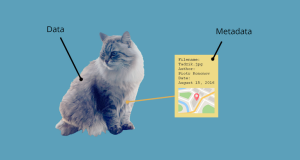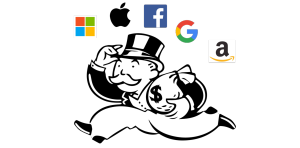
Google and Meta Platforms (Facebook) use metadata to control advertising. Metadata lets advertisers reach specific consumers for the same price as the general network. The aggregation and organization of markets, once done through journalism, no longer pays.
The same techniques, applied to content, led us to Trump. Victims stay within a walled garden of propaganda. Facts can never get in. People don’t just vote based on this. They refuse vaccines, buy guns, and die. He who controls the data makes the rules.

Thus, the technology press now hates the “Cloud Czars.” The companies whose cash flow built the modern Internet, with all its wondrous deflation, are now “big tech.” It’s why we make such a big deal out of online “privacy.” Finding customers and convincing them to buy is getting too easy, too cheap, and the business is in too few hands.
But there’s another side to the story.

Thanks to Obamacare, and the compromises made necessary to pass it, doctors still don’t have to color inside the lines. They don’t have to prescribe the cheap, generic medicine. They can make you buy the expensive stuff, even if you’re on Medicare. They don’t have to offer just the treatments that make the most sense. They can sell expensive “alternate” treatments and, since they’re doctors, insurers are obliged to pay. There are some limited controls. Such clinics might be deemed “out of network” and even the most well-insured bankrupted into paying their half the cost. Sick people are desperate, we listen to doctors. It’s always been this way.
American health care costs so much because it’s not an integrated system. You go to a doctor, she sends you to a specialist, and you’re never made aware of the business relationships that let them (and the drug salesmen who call on them) fleece you.
Managed care aims to do something about this.

But the revolution is going slowly. Centene still has a miniscule share of the health insurance market, and just a small share of Medicare patients.
Now comes a story I recently did for InvestorPlace.
Clover Health started life as a SPAC, sponsored by promoter Chamath Palihapitiya. I dumped on it. The stock is down 66% since it came public.

Over the last year, Clover has given away iPads, delivered low-cost virtual visits, and provided help in getting COVID vaccine appointments. Toy says the most important thing policy makers can do to control health care costs is to deliver reliable broadband to everyone.
Medicare has tighter cost controls than any other U.S. health care program save the VA, which is single-payer. The savings are welcomed by providers. When offered by Centene as part of the Obamacare exchanges, they’re welcomed by patients.
But the key is this. Data gives Clover the control over spending that Centene has, without having to buy out clinics.
It also illustrates an important point, one made first by the success of the Czars. He who has the data rules, and data is most powerful when part of a system.










